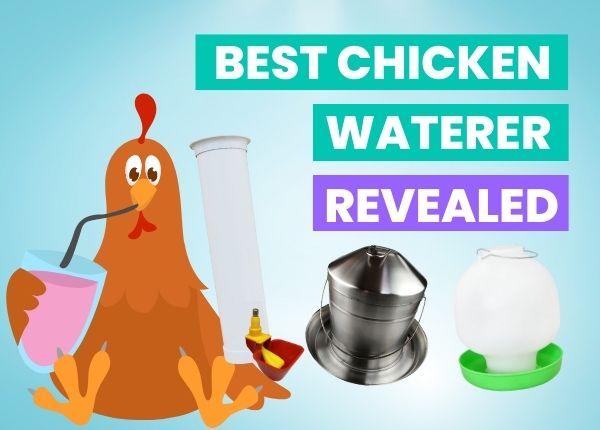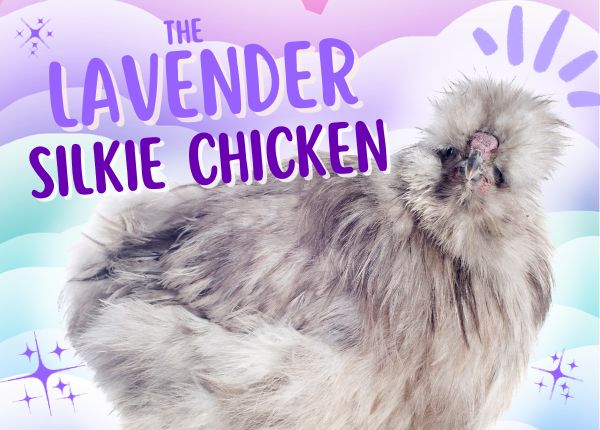
Chickens need chicken stuff! You can’t rock up home with a chicken, sit it on your sofa and serve up a pizza for supper.
But a waterer is just a waterer. Chickens drink from it. Water-nearth is all the fuss about?
Picking the right waterer for your feathery friends does matter, but why is selecting a glorified beaker H2-Oh so important?
Chickens chug a crazy amount of water for their size, and just 24 hours without fresh water can be fatal for them, or at the very least detrimental to their health and egg laying.
A good choice of waterer, or drinker, will make the difference between serving up a healthy tipple or a bacteria broth.
The perfect chicken waterer needs to hold enough water for your thirsty flock whilst keeping their water contained, fresh, clean, and cool (but never frozen). You need to be able to lift it, fill it, and clean it. It also needs to fit into your coop, and into your hectic day.
Got 20 questions about picking the right chicken waterer?
Cluckily, I’ve got 30 thirst-quenching answers for you!
1. Do I Need a Waterer for My Chickens?
A suitable waterer is one of the most basic but important purchases that you’ll make for your backyard chickens.
I’m usually a huge advocate of keeping things simple when it comes to chicken care, but to ensure a constant supply of fresh drinking water, a simple water bowl just won’t do. Here’s why…
2. Can I Use a Bowl for My Chickens Water?
Chickens are fowl, and by that, I mean they’re FOUL! They poop wherever the urge takes them, then they scatter the stuff around like confetti at a wedding. They’re clumsy little cluckers who have diddly squat consideration for their coop mates’ canteen facilities.
Water bowls and buckets get knocked and spilled. The water that somehow manages to stay in place is quickly filled with bedding, feathers, and other unmentionable stuff.
Polluted water is a breeding ground for bacteria and an easy cross-contamination route if any of your hens happen to be carrying a disease.
Damp bedding caused by spilled water is a haven for harmful bacteria, releases ammonia, and causes foot sores and frostbite.
For baby chicks 🐥 there’s an added risk of slipping and damaging those twiggy little legs, or worse, drowning.
3. Which Chicken Waterers Are Best?
There are loads of waterer systems, styles, and sizes available to buy. If you’re the handy type, then you can even make your own waterer.
The best waterer for your feathery family will depend on these 5 factors:
- The size of your flock which will dictate how much water they’ll need each day
- How often you’re happy or able to refill the drinking water
- Your climate, since colder climates can result in frozen water and warmer climates mean thirsty chickens and fast-growing algae films
- Your coop layout. The thing’s gotta fit!
- Your budget

4. Which Chicken Waterers Should I Avoid?
There aren’t any waterers on the market that are emergency-flashy-light-style unsuitable, but it’s worth keeping an eye out for older products that might still contain BPAs.
I’d highly recommend avoiding floor-standing waterers if you can. They’re considerably less hygienic than those that can be hung – even slightly - above ground level.
5. How Much Do Chicken Waterers Cost?
Chicken waters range from $5 for a small, self-contained waterer to $250 for a super-sized, super-fancy, automated gadget.
You can pick up a basic plastic 1.5-liter gravity water for a few US dollars, or a larger 10-liter one for about $15.
If you want to opt for a good-looking galvanized metal waterer, then that might set you back around $40.
For heated waterers, egg-spect to pay upwards of $40 for a heated base plate, or $70 for a self-contained heated waterer system.
If you’re clucking to cash in your nest eggs, then an all-singing-all-dancing drinker like a 12-gallon automated waterer with a heat coil could set you back by $80 - but oh my - they’re so cool!
6. Where Can I Buy Chicken Waterers?
You can buy chicken waterers in pet stores, farm stores, food stores, or even large department stores. You might be able to peck up a pre-loved bargain locally, and some of the best buys are often to be found online.
7. What’s a Self-Contained Waterer?

Self-contained waterers, or bell waterers, are the most basic, budget-friendly buy. They’re really just an upside-down bucket 🪣 that holds a body of water that drips into a drinking bowl at the base. They need refilling manually and regularly and can come with upgrades like drinking cups, nipples, or heaters.
8. What’s an Automatic Waterer?
The term ‘automatic’ can be a little bit deceptive in my opinion. True automatic waterers can be attached to your hose pipe and the drinking troughs or vessels automatically fill as required, so there really is no manual refill process.

These are brilliant if you have large flocks, can’t always be around, or might struggle physically changing the water. You’ll still need to keep them clean though and make sure they’re working okay daily.
Other automatic waterers have drinking troughs or cups that refill automatically as your chickens work their way through the water, so they always stay ¾ full.
These clever contraptions are fabulous for limiting the amount of drinking water 💦 that’s exposed at any one time, which reduces spills, waste, and the number of refills needed to replace contaminated water. That said, the water containers still need to be refilled, so I’m a bit iffy about whether they’re truly automatic.
9. Are Automatic Waterers Worth the Money?
Depending on your home and flock size, some egg-stra features may well be worth the money when you invest in your waterer, whilst others may be more 'nice to have' than necessary.
Whether you upgrade to an automatic (or, what I like to call semi-automatic) waterer depends on your budget and lifestyle.
Waterers are heavy when they’re full. They’re even heavier still when they freeze up! If you need to limit the manual lifting associated with full-on refills, then they’ll be worth a few extra dollars.
10. How Do Heated Waterers Work?
Heated waterers use an electric or battery-powered filament to keep drinking water just above freezing point.
The most popular heated waterers are self-contained plastic waterers which have purpose-built heating filaments secured in the base and are thermostatically controlled so they only draw power when needed.
You can also get standalone heaters: either heated plates that you sit galvanized waterers on or filaments that can be placed inside plastic or metal waterers.
I can’t help but worry about heated base plates being a recipe for disaster when paired with curious chooks. Try to think like a nosy chicken when you shop for any coop accessories, the ones that come with covers may be best to avoid burnt beaks.
Please don’t be a plonker! Never plonk your plastic waterer on a heated base. It’ll make for a molten mess in no time!
11. Are Heated Waterers Worth the Money?
Heated waterers are worth their weight in golden eggs.
They might sound like an unnecessary cluxury if you’re in the sunny ☀️ South, but they’re invaluable if you suffer colder climates, even if just for a few months of the year.
Picture yourself on a bitterly cold morning; it’s your day off work, you’re contemplating a cozy coffee in bed, and then you realize that the chickens’ water has probably frozen over. The last thing you’ll feel like doing is tottering down the bitter cold yard in your robe to manhandle a heavy, frozen waterer back up to the house, smashing up the ice, refilling it, and battling your way back down the yard with water splattering all over your slippers.
They’re worth it!
12. What’s The Cheapest Waterer Available?
Self-contained, plastic bell waterers are the most budget-friendly chicken waterers. If you can’t afford the techy stuff don’t get your feathers in a fluff. Bell waters are perfectly suitable for any flock, so long as you keep them clean and full.
13. Can I Make a DIY Waterer?
Loads of people DIY their drinkers! You can make fab waterers from all kinds of scraps and recycling found around the home and shouldn’t be afraid to try your hand at it.
There’s something eco-chic about keeping chickens and making your own coops, feeders, waterers, and even chicken feed is insanely satisfying and budget-friendly.
Take a peek at some of these crafty ideas from littleloveliesbyallison.com.
14. What Are Water Cups?
Ladies like to drink from a glass, and your hens are no different! Water cups are little plastic drinking cups that attach to plastic waterers. The idea behind drinking cups is to reduce mess, spills, and contamination via bacterial films and debris.
They’re brilliant for exposing only small amounts of drinking water to the elements at a time and encourage bossy birds to stand politely at the bar rather than scrapping over the same droplets of water. Yeah, some do. It’s known as water guarding.
15. What’s a Nipple Drinker?
Nipple drinkers are another smart way to stop spills and wastage, and they’re the top of the crops when it comes to reducing water contamination.

Nipple drinkers use the same concept as the drinking bottles used for hamsters and gerbils: chickens peck at the nipple for it to move back into the tube and release the seal which allows a small drop of water to release every time.
They’re a very smart choice if you live in a colder climate! Your chickens won’t be dipping their beaks into a body of water so there’s less water touching their beaks and faces, meaning less chance of frostbite.
Not all chucks will play ball though, or should I say nipple, and some may look blankly at you whilst you’re forced to demonstrate how they work.
The things we do for our chickens, hey!
16. How Much Water Do Chickens Need?

Chickens can drink up to a quart of water a day.
The usual stat disclaimers apply: smaller chickens tend to drink less than larger ones, heavily feathered varieties tend to drink more due to their warmer wardrobes, and chickens drink less in the cooler months than they do in the summer.
Laying hens will drink more than pullets or retired biddies, and all chickens drink more during their molt.
17. How Long Can Chickens Last Without Water?
In regular conditions, chickens can’t cope for any longer than 24 hours without dehydration starting to take its toll, and 48 hours without water may well be fatal. That’s why water matters so much in chicken care.
Dehydrated hens will stop laying for up to ten days, even after their access to water is reintroduced. Dehydration is serious and can lead to lameness, an impacted crop, and ultimately death.
18. How Often Do I Need to Replace My Chickens’ Water?
Chickens should be given fresh drinking water at least once a day, ideally twice a day in warm weather, and water shouldn’t be left stagnant for over 48 hours.
Baby Chicks will need a lot more TLC and more regular refills, as the egg-sperts at Chickenpedia explain:
“DON’T be tempted to cut corners and provide water in an open dish or saucer. Chicks will walk in it, tracking bedding and poop everywhere, which can spread disease. Dirty bedding will lead to the chicks getting wet and chilled, and the stress associated with this will open the way to disease. On top of this, with an open water bowl some chicks may even tragically drown! Damp conditions in a brooder must be avoided at all costs.” (Chickenpedia’s Beginners Guide To Keeping Baby Chickens Course)
19. What Size Waterer Should I Buy?
Your waterer needs to hold at least enough water for all the chickens in your flock for one day.
Most chickens will drink a pint a day but can drink twice as much on warmer days.
If you account for 2 pints (roughly one quart) per chicken per day, then you’ll be covered for thirsty chickens, spills, evaporation, or a last-minute drama at work meaning you miss an evening refill.
If you’re hoping to avoid a daily refill, then you’ll need to double the amount of water capacity.
20. How Many Waterers Will I Need?
If you have a small, friendly flock who get along just dandy then one waterer will do fine so long as you buy one with the right capacity for their needs.
If you have a larger flock, a single waterer large enough to meet their combined needs might be too heavy or large to handle daily. You could either opt for a few smaller waterers or invest in one with an automated hose feed.
If you’re integrating new chickens to an established flock, or if there’s trouble in Chickensville - like Doris and Daisy scraping over the local rooster - having two waterers in separate spots might help mitigate any more dramas.
21. Where Should I Keep My Chickens’ Waterer
Location. Location. Location. Pay attention to the positioning of your waterer.
Chicken waterers should be positioned in a shaded, elevated spot where chickens don’t tend to congregate.
A shaded spot will keep Tabatha’s morning tipple nice and chilled and slow down the build-up of bacterial films.
Positioning your waterer off the floor will massively reduce spills and pollution of the water.
Choosing a spot where your chickens don’t tend to gather, means they’re less likely to knock it over or kick debris into their water supply.
Being savvy about your beverage spot means your chickens' water stays fresher and healthier for longer. That means fewer refills, less hard graft, and less likelihood of illness.
22. Should I add Anything to My Chickens Waterer?
You don’t have to add anything to your chickens’ water supply, egg-specially if you’re replacing it with fresh water daily.
Some fellow fowl folks do choose to add supplements, and even ping pong balls to their chickens’ water. Here’s why…
23. Why Do People Put Ping Pong Balls in Waterers?
If you decide not to invest in a heated waterer, but suffer a cheeky cold spot, popping a ping pong ball in your waterer can help reduce the odds of the water freezing over. Just the slightest movement will cause small ripples on the surface of the water, reducing the odds of it freezing.
24. Why Put Apple Cider Vinegar in Chicken’s Water?
“You can add a small amount of apple cider vinegar to your chicks’ water supply because it is good for the digestive system of even very young chickens and can help ward off illness and disease” (Chickenpedia’s Beginners Guide To Baby Chickens)
25. Why Put Garlic in Chicken’s Water?
I sometimes wonder if there’s anything garlic isn’t good for! Garlic has a host of benefits including antibacterial properties, antiviral properties, antifungal properties, and antiprotozoal properties. It boosts your chickens’ immune systems, helps them digest food and gain weight (in a good way), and decreases dangerous cholesterols.
That’s why people put garlic in their chickens’ water!
Go too far though, and you can damage the balance of good bacteria in the gut, so take some eggs-pert advice from a reputable source like Chickenpedia’s chicken nutrition course before whacking an entire clove in a cup of water and force-feeding your baby chicks with garlic stew!
26. Why is My Waterer Turning Green?
A little alga in your chicken’s water isn’t worry worthy, but large amounts of Cyanobacteria (also known as blue-green algae) can produce toxins that are lethal to chickens if they’re ingested in large amounts.
Keeping your chickens’ waterer out of direct sunlight, cleaning it regularly, and replacing their water daily whenever possible, will avoid any dangerous bacterial build-ups.
27. Is Dirty Water Dangerous for Chickens?
Just as with alga, the odd poop, stray feather, or chunk of sawdust in your chickens’ favorite tipple won’t do any harm. They’ll eat worse off the floor just for the sake of it!
If you let the amount of water pollution, get too high though, you will be reducing the quality of their drinking water, and increasing the chances of your chooks picking up harmful bacteria.
28. How Often Should I Clean My Chickens Waterer?
Your chicken waterer needs cleaning at least weekly.
29. Is Warm Water Dangerous for Chickens?
Drinking warm water won’t harm your hens, but they won’t appreciate it, and they will give you the stink eye.
Chickens prefer cool water to drink, so if you want healthy, hydrated hens please supply their beverages chilled. They’ll even enjoy a few ice cubes in it in the warmer months.
In warm conditions, a waterer made of UV-resistant plastic will help keep the water cooler, and fresher, for longer.
30. 5 Things to Think About Before You Buy Your Waterer:
Before you hit buy, here’s a little food (or drink) for thought:
Thinking of that heated waterer?
Is the power cable going to be long enough to reach the coop? Manufacturers have a naughty habit of supplying shorter power cables.
Planning on a beastly big waterer?
How much will it weigh when it’s full? Is it going to be too heavy to handle?
Planning to hang your waterer?
Will it fit where you’re thinking, and will it be too heavy to hang?
Investing in a clever bit of chicken-keeping kit?
Make sure pricey purchases include a substantial warrantee. Weather, water, and wacky chickens can be a challenge for even the hardiest hardware!
Opting for a floor-standing waterer?
Does it need a perfectly flat surface, and if so, do you have one? Most of us don’t!
Let’s Take it to a Vote!
What’s The Best Waterer You’ve Ever Bought?
Yes, it’s true that your choice of poultry purchases will matter when it comes to raising healthy, happy, hydrated hens.
Don’t hit panic mode though and fill your cart in fear. All the gear and no idea is never a good way to go!
Make sure you’re fully kitted out with the knowledge and the know-how before you fill your backyard with pricey but pointless poultry purchases.
If you’re looking to invest in the nest, then Chickenpedia is the smart way to prepare for keeping chickens. Their clever courses cover all the information you’ll need to know from choosing the right coops and feeders to finding the right food and healthcare solutions.
With Chickenpedia’s beginner-friendly courses you’ll fly through your poultry-parent prep stage, ace the shopping trip whatever your budget, and feel confident that you’re ready to go with everything you need, and nothing that you don’t!











Leave a comment (all fields required)